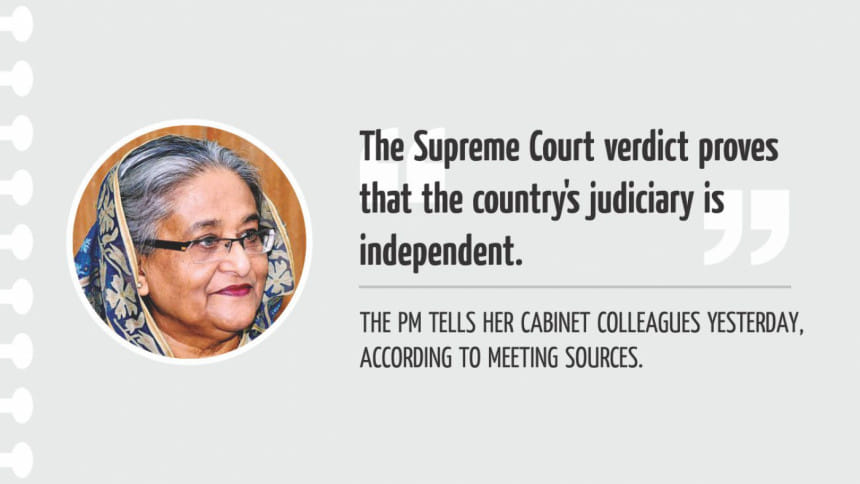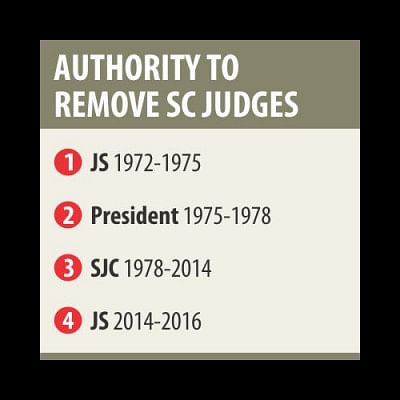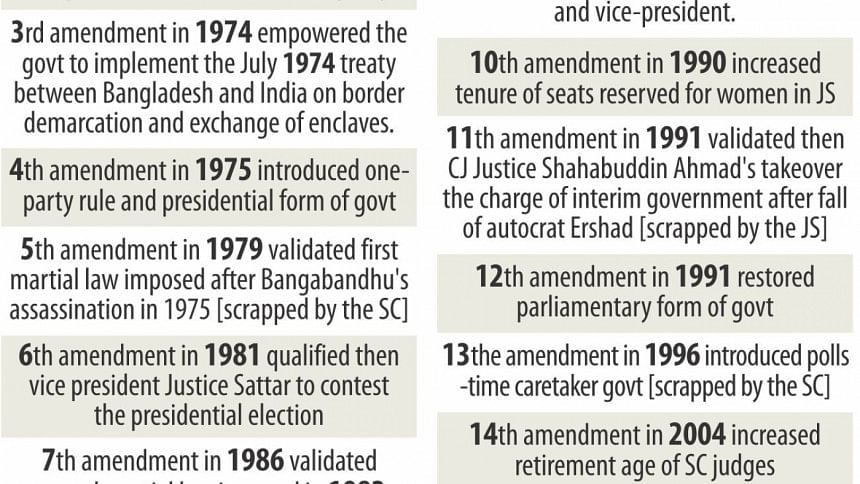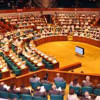Removal of SC Judges: Power not with JS

The Jatiya Sangsad no longer has the power to remove Supreme Court judges for incapacity or misconduct as the government has finally lost the legal battle to defend the controversial 16th constitutional amendment that restored this authority of parliament.
The High Court in May last year ruled that the amendment was illegal and unconstitutional as it found the changes went against the principles of the separation of powers and the independence of the judiciary.

In the legal battle with the HC, the government tried to defend the amendment which being passed in September 2014 abolished the chief justice-led Supreme Judicial Council to empower parliament.
On January 4 this year, it filed an appeal with the Supreme Court against the HC verdict.
After hearing the arguments for and against the appeal for over 11 days, a seven-member SC bench headed by Chief Justice Surendra Kumar Sinha yesterday unanimously upheld the HC verdict by rejecting the appeal.
While announcing the short order, the chief justice said they dismissed the appeal unanimously with some observations.
The observations will be learnt only after release of the copy of the full verdict.
However, the arguments during the hearing of the appeal and the HC's observation made it clear that Article 70 of the constitution that prevents MPs from working in parliament independently largely contributed to declaring the amendment illegal.
In its verdict, the HC strongly criticised Article 70 as well as the lack of unity among political parties.
During the hearing of the appeal, Chief Justice Surendra Kumar Sinha also criticised the restriction on MPs imposed by Article 70.
Now a question is being raised whether the previous system would be automatically reinstated in the constitution.
According to Attorney General Mahbubey Alam, “a vacuum” would be created following the SC judgment.
The SJC will not be automatically restored following the SC verdict, as the court cannot do the act which is done by parliament, he said in a news briefing.
Talking to reporters, barrister M Amir-Ul Islam, however, said the Supreme Judicial Council will be restored following the cancellation of the amendment.
It is the custom that when a new law is formulated through repealing a previous law and if the new law is challenged and scrapped by the SC, the previous law is automatically restored, he claimed.
Contacted by The Daily Star, Law Minister Anisul Huq said the government will decide the next course of action on receiving the copy of the full verdict.
Asked whether he is satisfied or disappointed with the apex court verdict, the law minister refused to make any comments.
Talking to her colleagues about the apex court judgment during yesterday's cabinet meeting, Prime Minister Sheikh Hasina said the verdict proved that the country's judiciary is independent, meeting sources said, adding she asked her cabinet colleagues not to express resentful reaction over the verdict.
The attorney general, however, expressed his dismay at the verdict.
“I am very sad over the Supreme Court verdict as the original constitution of 1972 could not be restored following this judgment," he said.
Bangabandhu Sheikh Mujibur Rahman had said that the constitution of 1972 was written with the blood of martyrs, he said.
"We had a dream that we will go back to the original constitution. We had gone back to some provisions of the original constitution through the Supreme Court verdicts in the cases regarding fifth, seventh, eighth and thirteenth amendments of the constitution," added the AG.
"We expected that we will go back to Article 96 of the original constitution [that empowered parliament to remove a Supreme Court judge for incapacity or misbehaviour].”
Writ petitioners' lawyer Manzill Murshid expressed satisfaction at the SC verdict. He termed it an epoch-making judgment in the history of judiciary.
He said the SC has dismissed the appeal filed against the HC verdict and came up with findings that will be disclosed in the full judgement.
The apex court will also make observations and expunge some words in the full verdict, the lawyer said.
The original constitution of 1972 empowered parliament to remove SC judges. But the fourth amendment to the constitution in 1975 scrapped parliament's power and empowered the president to remove SC judges.
Gen Zia curtailed the president's power and introduced the Supreme Judicial Council in 1978. It was ratified and validated by the fifth amendment to the constitution in 1979.

According to the then provision, the SJC comprising the chief justice and two senior SC judges investigates allegations of misconduct against any SC judge, and makes necessary recommendations to the president for the next course of action.
In 2005, the HC declared the fifth amendment illegal but condoned the introduction of the SJC.
In February 2010, the SC upheld the 2005 HC verdict, and said the system of SJC would be valid till December 31, 2011.
Around six months before the provision on the SJC was to expire, the AL-led government included it in the 15th amendment to the constitution, allowing the SJC to continue.
But later in September 2014, the AL government abolished the decades-old SJC and restored parliament's authority to remove SC judges.
SHOULD ARTICLE 70 BE BLAMED?
The 16th amendment was challenged with the HC through a writ petition filed by nine SC lawyers.
During the hearing on the petition, the attorney general in defence cited the practices in the UK, the US, India, Canada, Australia and a few other countries where parliaments retain the power.
"But there is a fundamental difference between the lawmakers in those countries and those in our country. In the US, the UK, Canada and Australia, the lawmakers are free to perform their functions in parliament. No restriction like that imposed by Article 70 of our constitution exists in those countries," the HC said in response to the AG's argument.
In India, however, there are some restrictions on the lawmakers; yet they don't blindly obey the party's decisions because of prevalence of democratic practice in the parties, it said.
"Keeping Article 70 of Bangladesh constitution as it is, the members of parliament must toe the party line in case of removal of any judge of the Supreme Court. Consequently, the judge will be left at the mercy of the party high command,” read the HC verdict delivered by Justice Moyeenul Islam Chowdhury and Justice Quazi Reza-Ul Hoque.
“As regards to Article 70 of the constitution of Bangladesh, we must say that this article has fettered the members of parliament. It has imposed a tight rein on them. Members of parliament cannot go against their party line or position on any issue in the parliament.
"They have no freedom to question their party's stance in parliament, even if it is incorrect. They cannot vote against their party's decision.”
They are, indeed, hostages in the hands of their party high command, said the two judges.
During the hearing on the appeal against the HC verdict, Chief Justice Sinha on May 23 said the government doesn't have faith even in its own lawmakers as Article 70 is still in the constitution.
“You don't trust your own party lawmakers. Members of parliament cannot work independently because of Article 70 of the constitution. Why have you kept this article in the constitution?” he asked the attorney general.
“Why can't you have faith in parliament?” questioned the chief justice.
Mahbubey Alam defended Article 70 saying that there is a history of Article 70.
The provision came into being amid “horse-trading” taking place in different countries, said the AG.
In terms of politics, “horse-trading” is bringing in members from the opposition party to gain majority in parliament by resorting to unethical means.
In response, the chief justice asked if there is any certainty that “horse-trading” will not take place while making decisions about judges.
He said there should be an exclusive hearing on Article 70. “We cannot say everything here as it will surface in the media.”
Article 70 says, “A person elected as a member of parliament at an election at which he was nominated as a candidate by a political party shall vacate his seat if he resigns from that party; or votes in parliament against that party; but shall not thereby be disqualified for subsequent election as a member of parliament.”
Nine of the 12 amici curiae appointed by the SC to give opinions on the appeal suggested scrapping the amendment. One spoke in favour of the amendment while two others did not place any deposition.


 For all latest news, follow The Daily Star's Google News channel.
For all latest news, follow The Daily Star's Google News channel. 








Comments